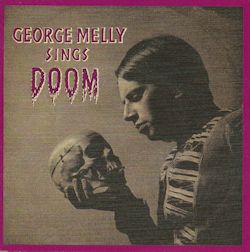1. Frankie And Johnny
2. I'm Down In The Dumps
3. Muddy Water
4. Miss Jenny's Ball
5. Organ Grinder
6. You've Got The Right Key But The Wrong Hole
7. Kingdom Coming
8. I'm A Ding Dong Daddy
9. Waiting For A Train
10. Railroadin' Man
11. My Canary Has Circles Under His Eyes
12. Heebie Jeebies
13. Send Me To The 'lectric Chair
14. Cemetery Blues
15. Blue Spirit Blues
16. Death Letter
17. Black Bottom
18. Magnolia
19. Michigan Water Blues
20. Ma Rainey's Black Bottom
21. St. Louis Blues
22. Spider Crawl
23. Abdul Abulbul Amir
24. Get Away, Old Man, Get Away
25. Granny's Old Armchair
26. Donald The Dub
27. Television interview concerning the popularity of jazz
Collective personnel
George Melly – Vocals
Alex Welsh, Mick Mulligan – Trumpet
Roy Crimmins, Frank Parr – Trombone
Ian Christie – Clarinet
“Poggie” Pogson – Tin whistle
Fred Hunt, Ronald Duff – Piano
Nevil Skrimshire, Nigel Sinclair – Guitar
Frank Thompson, Terry Forster, Alan Duddington – Bass
Pete Appleby - Drums
This is an anthology of singles and tracks from EPs recorded by George Melly between 1956 and 1959. The EPs includeGeorge Melly with Mick Mulligan’s Band, George Melly Sings “Doom”, George Melly Sings the Blues, and Abdul Abulbul Amir – George Melly Sings Songs of Frank Crumit.
Melly might be called a Renaissance man, given his interest in art (especially surrealism) and writing (author of several autobiographies as well as other
books, besides working as a film and TV critic). But his public image was of a hard-drinking, garishly-dressed singer known as Good Time George. The tracks
here give a sketch of his vocals before he retired temporarily from singing in the 1960s – a career which he resumed in the 1970s.
Melly’s idol was blues singer Bessie Smith, and you can hear some of her inflections in his vocals, although his voice sounds much younger – rather less
mature - than it did in his later years. The blues dominate his repertoire, particularly given George’s obvious liking for the genre’s double entendres (e.g. You’ve Got The Right Key But The Wrong Hole) and the gloomier aspect of the blues (note the album title). As Melly
says in his sleeve-notes “The two main subjects with which the blues are concerned are sex and death”.
Melly sings with patent, infectious enthusiasm, even if he is not the world’s greatest vocalist. And he is accompanied by equally enthusiastic musicians,
including such top instrumentalists as clarinettist Ian Christie (listen to his fine solo on You’ve Got The Right Key) and pianist Ronnie Duff
(contributing characterful solos to such tunes as Muddy Water). George is accompanied on many tracks by the Mick Mulligan Band, with which he sang
for some years, mainly in the 1950s. Mulligan’s imperious trumpet comes through well on tracks like Organ Grinder and Cemetery Blues.
Mulligan’s trombonist, Frank Parr, is heard soloing and commenting behind Melly’s vocal in Send Me To The ‘lectric Chair.
The album ends with four songs written or adapted by Frank Crumit, a singer who specialised in novelty songs which were often humorous or whimsical. Crumit
is barely remembered today, although I listened to some of his recordings on 78 rpm records in my formative years. It is typical of George Melly that he
respected the memory of an entertainer like Crumit who has been neglected. These songs are followed by a short 1959 interview in which Melly talks about
jazz, musicians and his success as a singer. The interviewer asks such strange questions as “What is the difference between jazz and scat singing and pop
singing?”
Tony Augarde
www.augardeBooks.co.uk
